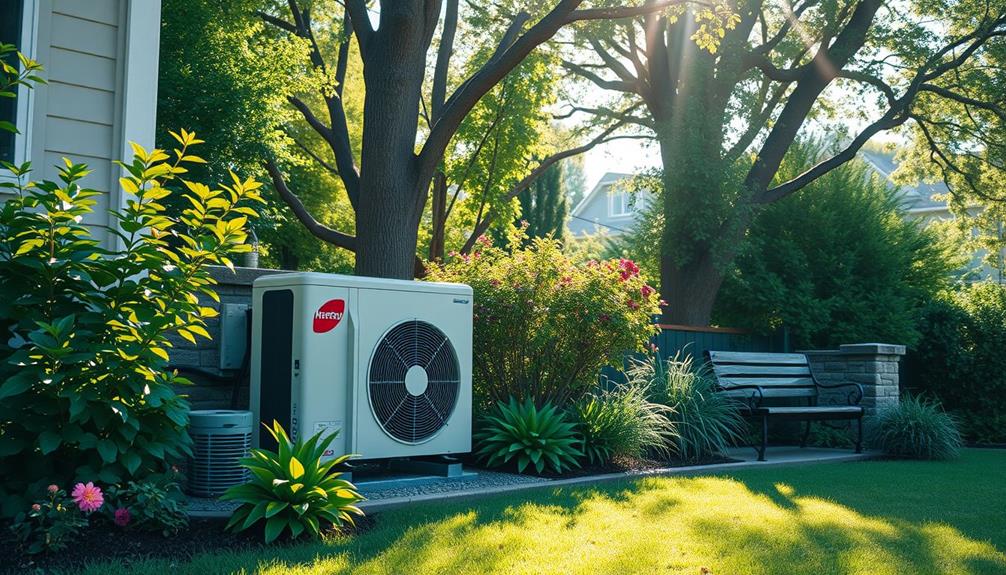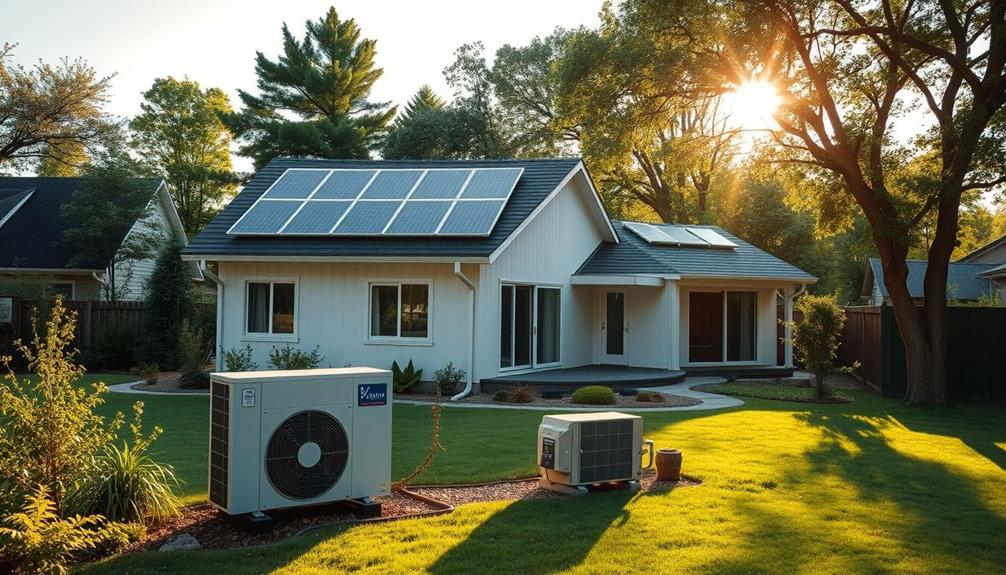Switching to a heat pump system can drastically reduce your carbon footprint. It's known to cut greenhouse gas emissions by at least 20% compared to traditional gas boilers, and when powered by clean energy, this figure can soar to 80%. You'll not only lower your CO2 output but also benefit from improved air quality, thanks to fewer air pollutants. The shift to heat pumps can fulfill nearly 20% of heating needs by 2030, making it a vital step toward sustainability. If you're curious about its practical benefits and incentives available, there's plenty more to explore.
Key Takeaways
- Heat pumps reduce greenhouse gas emissions by at least 20% compared to traditional gas boilers, contributing to climate change mitigation.
- Utilizing renewable energy with heat pumps can lead to a CO2 emissions reduction of up to 80%.
- They decrease natural gas demand by up to 21 bcm in the EU, promoting energy security and reducing fossil fuel reliance.
- Heat pumps produce fewer air pollutants, enhancing both indoor and outdoor air quality for healthier living environments.
- Projected growth in heat pump adoption is expected to significantly lower air pollutants from combustion heating by 2030.
Overview of Heat Pump Systems
Heat pump systems are innovative technologies that efficiently transfer thermal energy, making them a popular choice for heating and cooling. These systems work by moving heat from a colder area to a warmer area through a refrigeration cycle, which includes evaporation, compression, condensation, and expansion.
Understanding thermal dynamics is essential for optimizing heat pump performance, and you'll find the most common types of heat pumps are air-source, ground-source (geothermal), and water-source, all capable of providing both heating and cooling for your home or business.
In recent years, heat pumps have gained traction, accounting for about 10% of global space heating needs in 2021. Their capacity is expected to soar from 1,000 GW in 2021 to nearly 2,600 GW by 2030.
One of the standout features of modern heat pumps is their remarkable efficiency. They can achieve efficiencies exceeding 300% to 400%, meaning they produce 3-4 units of heat for every unit of electricity consumed, as measured by their Coefficient of Performance (COP).
Benefits for the Environment

The environmental benefits of heat pumps are significant and far-reaching. By switching to heat pumps, you can reduce greenhouse gas emissions by at least 20% compared to traditional gas boilers. If your electricity source is cleaner, this reduction could soar to 80%. This change has the potential to cut global CO2 emissions by half a gigatonne by 2030, playing a key role in climate change mitigation.
Additionally, the adoption of heat pumps aligns with cybersecurity strategies that prioritize sustainable energy solutions, emphasizing the importance of innovative technologies in reducing carbon footprints.
In regions utilizing renewable energy, heat pumps are less carbon-intensive than fossil fuel heating systems, leading to improved air quality and a decreased reliance on fossil fuels. You'll also contribute to energy security, as the adoption of heat pumps can reduce natural gas demand by up to 21 billion cubic meters in the EU alone, which is significant given rising gas prices.
Moreover, heat pumps produce fewer air pollutants associated with combustion heating, enhancing both indoor and outdoor air quality. This improvement is essential for public health, ensuring a cleaner environment for you and your community.
Economic Considerations and Barriers
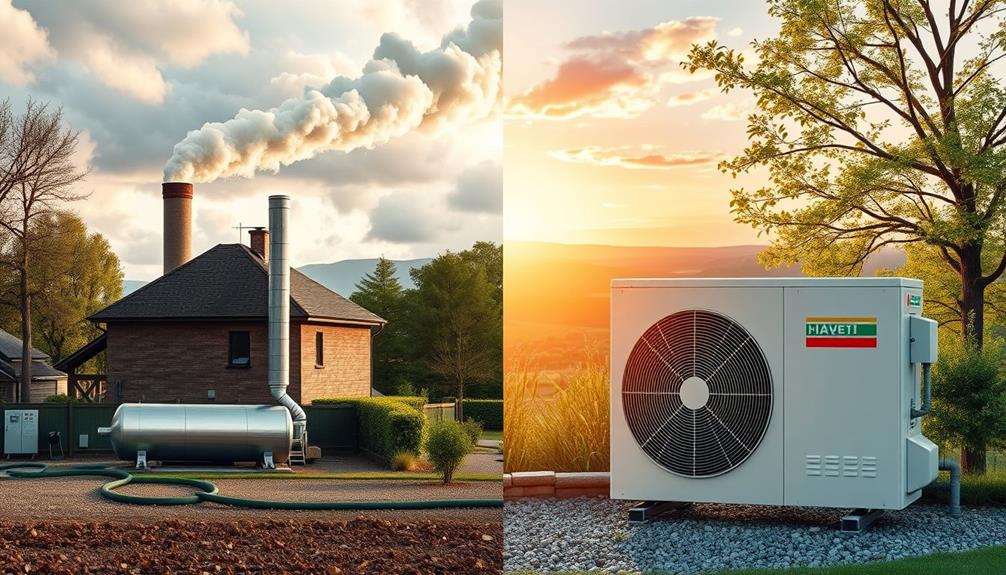
Adopting heat pumps often comes with economic challenges that can deter homeowners and businesses alike. The initial upfront costs of these systems can be greatly higher than traditional heating options, which can make potential adopters hesitant despite the long-term savings on energy bills.
Additionally, operational efficiency varies based on climate conditions, and in extreme cold regions, the effectiveness of heat pumps may not meet expectations without specific models or supplementary systems. Furthermore, understanding the potential financial benefits of efficient systems, such as those related to credit card insights, can help motivate investment in heat pumps.
For building owners, the split incentives between them and tenants complicate the decision to install heat pumps. Tenants may benefit from lower energy bills, while owners face the financial burden of retrofitting older buildings to accommodate these systems.
Though retrofitting can help mitigate increased electricity demand, it often incurs additional costs that can hinder adoption.
Government incentives and financial assistance programs play an essential role in overcoming these economic barriers. By providing support, they make heat pumps more accessible to a broader audience, encouraging both building owners and tenants to take into account this efficient energy source for their heating needs.
Future Trends in Heat Pump Adoption
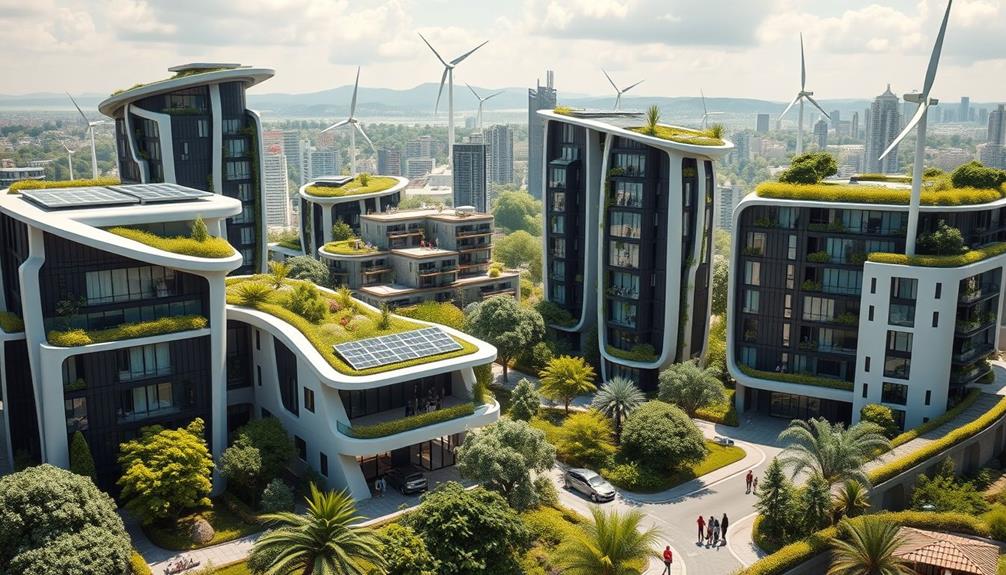
As economic barriers begin to diminish through increased government support and awareness of long-term savings, future trends in heat pump adoption look promising. The global market for heat pumps is set to grow considerably, with capacity projected to rise from 1,000 GW in 2021 to nearly 2,600 GW by 2030. This shift is essential for reducing reliance on fossil fuels and addressing energy security concerns in the EU, where sales are expected to skyrocket from 2 million to 7 million units.
Additionally, as the market matures, consumers will benefit from enhanced efficiency and user-friendliness through advances in technology and smart home integration.
You can expect several key developments in the heat pump sector:
- A quadrupling of demand for heat pump installers by 2030, emphasizing the need for reskilling programs.
- Increased government incentives to facilitate retrofitting existing buildings for heat pump systems.
- A considerable contribution to reducing greenhouse gas emissions as heat pumps cover nearly 20% of total heating needs in buildings.
These trends not only promise to revolutionize heating systems but also amplify their positive environmental impact, making installing heat pumps an increasingly attractive option for consumers.
Conclusion on Sustainability Impact
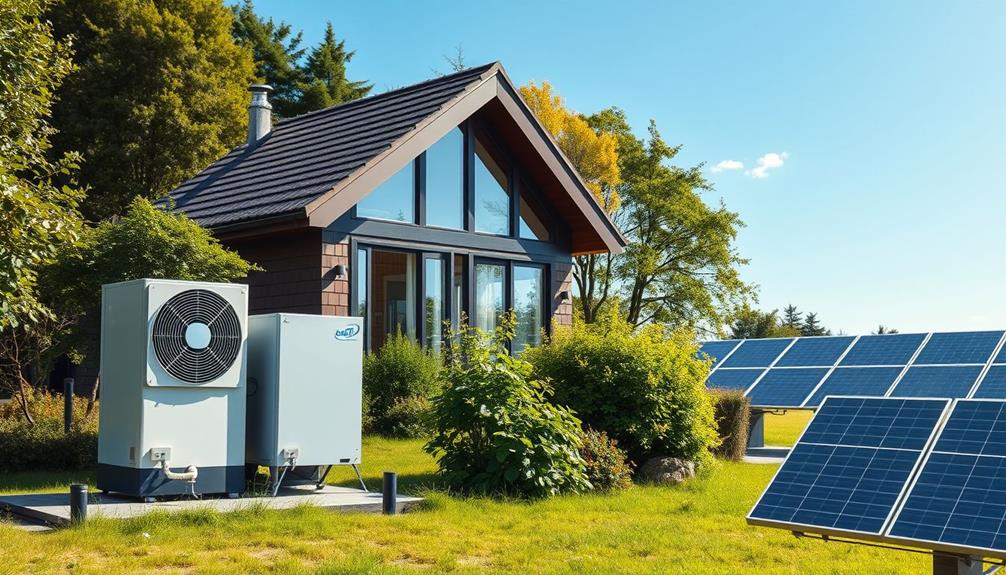
Recognizing the substantial sustainability impact of heat pumps, you can see how their adoption presents a transformative opportunity for reducing greenhouse gas emissions. By switching to heat pumps, you can achieve at least a 20% reduction in emissions compared to traditional heating methods like gas boilers.
Incorporating energy-efficient practices, such as regular maintenance and ideal usage, can further enhance these benefits, contributing to a more sustainable lifestyle essential foods for combating colds. With cleaner electricity sources in the mix, this reduction can soar to as much as 80%.
By 2030, heat pumps are projected to meet nearly 20% of total heating needs in buildings, further solidifying their role in the sustainable energy transformation. This shift not only promotes energy security but also decreases reliance on natural gas, with a potential demand decline of 21 bcm in the EU alone.
Moreover, as heat pump installations increase, air pollutants from combustion heating are expected to decline, leading to improved air quality and enhanced public health.
Ultimately, the move towards heat pumps represents a vital step in achieving significant emission reductions, supporting sustainability, and fostering a cleaner, healthier environment for everyone. Embracing this technology is a commitment to a more sustainable future.
Frequently Asked Questions
Is a Heat Pump Bad for the Environment?
You might think a heat pump's impact on the environment is negative, but it's actually quite the opposite. They reduce greenhouse gas emissions considerably, especially when powered by renewable energy, improving air quality and promoting sustainability.
What Is the Major Disadvantage of a Heat Pump System?
Oh sure, let's freeze in style! The major disadvantage of a heat pump system is its struggle in frigid temperatures, often leaving you scrambling for backup heat and potentially jacking up your energy bills. How cozy!
What Is the Carbon Footprint of an Air Source Heat Pump?
The carbon footprint of an air source heat pump depends on your regional energy mix. If you're using cleaner electricity, you'll considerably reduce emissions, making it a more eco-friendly option compared to traditional heating methods.
Why Are Heat Pumps Not the Future?
You might think heat pumps are the future, but their higher costs, efficiency issues in cold climates, and the need for retrofitting older buildings create hurdles that slow their widespread adoption and acceptance.
Conclusion
Switching to a heat pump system can feel like planting a tree in your backyard—you're not just making a choice for today, but for future generations. The environmental benefits, from reducing carbon emissions to enhancing energy efficiency, are clear. While economic barriers exist, the long-term savings and positive impact on our planet can't be ignored. Embracing heat pumps isn't just a smart move; it's a step toward a greener, more sustainable future for everyone.
